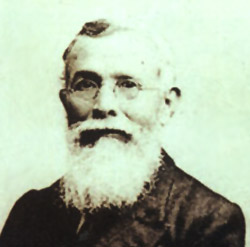 Dadabhai Naoroji, reverentially remembered as the Grand Old Man of India, was an Indian political leader, educator and a cotton trader. He was associated with the Indian National Congress since from its inception. Dadabhai Naoroji laid the foundation of India`s contemporary freedom struggle. He was the first Asian to become a British Member of Parliament. In 1901, he wrote the book `Poverty and Un-British Rule in India`, focussed on the exploitation of the colonial rule that was exhausting India`s wealth. He is also considered as one of the founders of Indian National Congress. When the nationalistic co-operation between the princely states of India was completely shattered by the East India Company, Dadabhai Naoroji, a peerless patriot came to prominence who defined the modern Indian freedom struggle.
Dadabhai Naoroji, reverentially remembered as the Grand Old Man of India, was an Indian political leader, educator and a cotton trader. He was associated with the Indian National Congress since from its inception. Dadabhai Naoroji laid the foundation of India`s contemporary freedom struggle. He was the first Asian to become a British Member of Parliament. In 1901, he wrote the book `Poverty and Un-British Rule in India`, focussed on the exploitation of the colonial rule that was exhausting India`s wealth. He is also considered as one of the founders of Indian National Congress. When the nationalistic co-operation between the princely states of India was completely shattered by the East India Company, Dadabhai Naoroji, a peerless patriot came to prominence who defined the modern Indian freedom struggle.
Early Life of Dadabhai Naoroji
Dadabhai Naoroji was born on 4th September, 1825 in Bombay (presently Mumbai), to the parents Naoroji Palanji Dordi, a poor Parsi priest, and Maneckbai. He studied at the Elphinstone College where he made exceptional performance. He had been acclaimed by one of his professor as the promise of India.
Achievements of Dadabhai Naoroji
A versatile scholar, Dadabhai Naoroji began his career as the professor of Mathematics and Natural Philosophy. But in 1855 he left the profession and moved to London as the partner of the Parsi firm. In 1859, he started his s own business of cotton trading, but later, at University College London, he became professor of Gujarati. Naoroji facilitated the establishment of the East India Association in 1867. Dadabhai Naoroji was elected as Prime Minister of Baroda and accepted the office of Diwan in 1874. He also became a member of the Indian National Association originally established by Sir Surendra Nath Banerjee from Calcutta (Kolkata) and later founded the Indian National Congress with similar objectives and aims. Eventually the two groups united and Naoroji became the president of the Indian National Congress. He again moved back to Britain and in the year 1892, he became the first Indian member of the House of Commons. Moreover, he became the President of the Indian National Congress thrice, in 1886, 1893 and 1906.
From his very childhood, Dadabhai Naoroji was sympathetic to the socio-political condition of his countrymen. Therefore he was very much active in taking steps for the social and the political advantage of his countrymen. He founded the Dyan Prasarak Mandali and a Girls High School at Bombay for the purpose of educating the women. He also established the Bombay Association in 1852. The Bombay Association was the first political association in India. During the long years of his stay in London, he made every effort to make the English people aware about the Indian affairs. He established the London Association and the East India Association in order to propagate his ideals among the European people. In this way Dadabhai Naoroji became the national hero.
In politics Dadabhai Naoroji was conscious of the numerous benefits that the Indians derived from the British rule in India. He pledged "loyalty to the backbone" to the British crown and "the permanent continuance" of the British rule in India. As the congress Movement passed its early years of development, it demanded for Swaraj. Although Bal Gangadhar Tilak first raised the slogan that "Swaraj is my birth s right", it was Dadabhai Naoroji who demanded for Swaraj from the platform of Congress. In Calcutta Session during delivering his Presidential address in the Calcutta session he emphasized the need for self-government or Swaraj. However, Dadabhai Naoroji had enough faith in the justice and the statesmanship of the British.
It was Dadabhai Naoroji who exposed the exploitative nature of the British ruler in India. He was the first Indian who drew the attention of both the Indians as well as the Europeans, to the economic exploitation of India. He brought to the public notice the drain of Indian wealth to the European countries and the resulting poverty of the Indians. In his book, Poverty under British rule in India, Dadabhai Naoroji, proved his thesis of drain of wealth logically. He brought to notice that the relation between the Government and the common people in India was that of a master and slave. The Indians were plundered and oppressed continuously. Dadabhai during his presidency in the assembly of Indian National Congress brought all these issues to the public notice.
Personal Life of Dadabhai Naoroji
Dadabhai Naoroji was married to Gulbai at the mere age of eleven as a traditional custom. Mahatma Gandhi and Gopal Krishna Gokhale considered Naoroji as their guide and mentor. Naoroji died at the age of 92, on June30, 1917, in Bombay (Mumbai)
Dadabhai Naoroji due to his contribution in the field of the socio-political progress in India was venerated as a divine man. He was a unique figure in Indian history and was often compared with Gladstone.




















